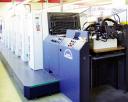 – printery, antibiotics plant among facilities
– printery, antibiotics plant among facilities
A US$30 million investment is about to take off at the old Sanata Textile Mill complex at Industrial Site, Ruimveldt.
It will include a modern multifunctional printing press, new textile milling equipment and a research and development (R&D) facility for the manufacture of pharmaceuticals.
The investment promises 1,200 new jobs, half of which should be a reality by the end of this year.
This is according to a joint statement issued by National Industrial and Commercial Investments (NICIL), Queens Atlantic Investment Incorporated (QAII) and the New GPC Incorporated (NGPC) yesterday.
QAII is the parent company of NGPC, which was established after the privatisation of Guyana Pharmaceutical Corporation.
The privatisation of Sanata has taken the form of the issuance of a 99 years lease to QAII at a substantive rental of approximately $50 million per annum. The government through NICIL has implemented strict guidelines for the execution of this project.
The release said the investor envisages an overall investment of US$30 million and the creation of 1,200 jobs of which 600 new permanent jobs would become a reality by the end of 2008. Rehabilitation and construction of the facilities, which commenced in June 2007, are being phased over a three-year period.
It said installation of machinery and renovation works on the complex are currently moving apace with an estimated $1.5 billion in investments to date. Prior to this $400 million was spent on the removal of asbestos from the buildings.
Upon completion, the complex will house a modern textile mill for gauze, bandages and denim production, a state-of-the-art printery, an antibiotics plant and R&D facility, a pharmaceutical export processing facility, and a hardware manufacturing division.
The joint release said that with the ever-increasing competition in the textile industry from China, India, Pakistan and some Central American counties QAII took the decision to embark on the production of medicated and non-medicated gauze and bandage and the production of denim fabric.
“To this end QAII has acquired machinery for the textile mill worth some US$3.5 million. The new mill, which will comprise components from China and Italy, has the capacity for denim production in excess of two million yards of fabric per annum for the export market,” the joint release said.
The textile mill is scheduled to commence operations in July/August of this year.
The complex will also include a hardware manufacturing division, which will produce dimensional stones and tubing to replace copper pipes used in various industries.
The release said the printery will house a flexographic machine, a Mann Roland offset press and components for web printing. It said these presses will be used to vertically integrate the printing needs of NGPC as well as to support local manufacturers.
“The flexographic machine, which will be a first in Guyana, will create a number of exciting opportunities and stimulate the local packaging industry. In particular the many small and medium sized manufacturers who find it difficult to acquire custom designed packaging for their products will find this press most beneficial,” the statement said.
It said that the machine can produce a wide assortment of labels, bags, boxes for various juices, beverages and pharmaceuticals. It will be equipped with the latest technology in digital offset and web printing and will allow QAII to print books, magazines, brochures, leaflets, newsprint and newsletters.
Speculation is rife that the intention of the new company is to put out a publication of some kind, but none of the officials would say whether this is so.
“It can also design and create any printed material to package vegetables, fruits and a wide range of other farm produce. With its numerous capabilities this press will be a big boost to the country’s efforts to diversify the economy through value-added industries,” the joint statement said.
The release said the antibiotic plant and R&D facility will be set up through a collaborative effort between NGPC and a leading multinational pharmaceutical company from India. “In 2001 NGPC was the first company in the region to manufacture anti-retroviral drugs with assistance also from India. In another partnership i.e. with Heinz and Ped Med Canada, the company manufactures micronutrient supplements for the Basic Nutrition Programme,” the release said.
It said that the pharmaceutical export processing facility would be used to consolidate the export of NGPC products and bulk medicines to the region and North America. The local health sector will again benefit significantly from the availability of a wider range of medicines.
Prior to government approving the privatization, Sanata was leased to and managed by the China Textiles Industrial Corporation for Foreign Economic and Technical Cooperation of China.
In 2000, the assets of the company were brought under NICIL’s control and subsequently a new company G&C Sanata was established.
This was followed by further investments but due to high production and electricity costs as well as the loss of preferential markets, the company was forced to cease operations in 2005. The release said that following this, the government advertised for investors to lease the property. It said that in the ensuing period, there was widespread vandalism and flooding and the property became totally overgrown with vegetation.
“After a challenging start, this company was successfully returned to profitability by the investor. In the process, the future and prestige of the world famous Limacol, Ferrol and other household brands have been restored. More importantly, through various social and collaborative programs NGPC is now an important contributor to and the undisputed leader in the local and regional health sector. The company also takes pride in providing sustainable employment to its employees, in being an environmentally friendly manufacturer and in its track record as a good corporate citizen,” the statement said of NGPC.








